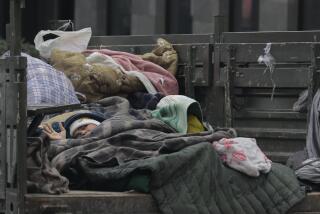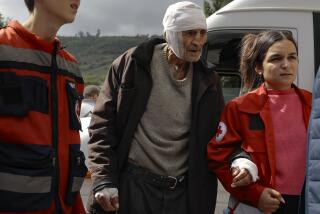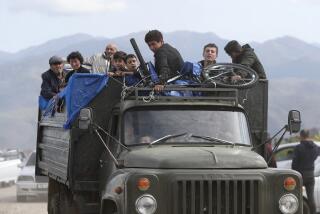Moscow Vows Crackdown on Armenian Unrest
- Share via
MOSCOW — The Soviet leadership warned Tuesday that it will crack down on Armenian activists if they resume their protests after rejections of their demand that Armenia be given control of the disputed Nagorno-Karabakh region.
“Lawlessness will not be permitted by our law enforcement agencies,” said Pyotr N. Demichev, deputy leader of the Supreme Soviet, the nominal national Parliament. “They will not allow wrongdoing to continue as it has for the past five months.”
Demichev said at a news conference that if the unrest in the Armenian capital of Yerevan continues, “we will have to resort to our constitutional rights.” The first step, he said, would be to impose a curfew.
He said no force will be used against strikers in Yerevan and Nagorno-Karabakh, but he indicated that an effort will be made to persuade them to return to work.
Presidium Rejected Demand
“We hope to settle these issues politically,” he said. “Officials from party and government bodies on the spot will appeal to reason. . . .”
Demichev met with the press after the Presidium, or executive body, of the Supreme Soviet rejected Armenia’s demand that administrative control of Nagorno-Karabakh be transferred to Armenia from the neighboring republic of Azerbaijan, the site of the disputed region.
The majority of the people in Nagorno-Karabakh are ethnic Armenians and like most Armenians are Christian, while the Azerbaijanis are for the most part Muslim. Resentment against what the people in Nagorno-Karabakh perceive to be cultural harassment led to strikes and demonstrations that have continued since February. By official count, 36 people have been killed.
The unrest has confronted Soviet leader Mikhail S. Gorbachev with a crisis that has raised questions about his reform program, which is commonly called perestroika .
In a speech Monday to the Presidium, Gorbachev admitted as much. He said that failure to resolve the crisis would have far-reaching consequences and affect the perestroika effort.
Although the Presidium ruled that the disputed region is to remain a part of Azerbaijan, it promised to strengthen the region’s ties to Armenia and to provide assistance for cultural development. It set up a commission to monitor conditions in the region and report to the Supreme Soviet.
Demichev said that a proposal to raise Nagorno-Karabakh’s status from autonomous region to republic will be considered.
Decisions on Nagorno-Karabakh, he said, will set a precedent for dealing with ethnic problems elsewhere in the Soviet Union. There are more than 100 distinct nationalities in the country, and controlling ethnic aspirations is regarded as a strong challenge for Gorbachev as he eases restrictions on some aspects of Soviet life.
Monday’s debate in the Presidium was one of the most heated and emotional exchanges among high Soviet leaders in recent memory. The decision to reject Armenia’s demand was considered so sensitive that it was withheld from the public for a day.
When it was finally announced, television viewers were treated to yet another first--Gorbachev chastising the representatives of Armenia and Azerbaijan.
Gorbachev Shows Impatience
“Why can’t you live like brothers?” Gorbachev demanded of Grant M. Voskanyan, the head of Armenia’s Parliament. “We want to help you return to quiet conditions.”
A few minutes later, Gorbachev was shown impatiently demanding to know what guarantees of freedom from harassment Azerbaijan could offer the ethnic Armenians of Nagorno-Karabakh.
Soviet journalists contacted by telephone in Yerevan on Tuesday reported the city quiet, but at that time many in the city were not yet aware of the Presidium’s decision.
A 2-week-old general strike in Yerevan was called off over the weekend in advance of the Presidium meeting, but a 2-month-old strike in Nagorno-Karabakh is said to be continuing.
“We hope people will realize that strikes won’t bring results,” Alexander V. Vlasov, the Soviet interior minister, said Tuesday.
He said that 3,000 troops had been used to break up a sit-in at Yerevan’s airport earlier this month and that a 22-year-old protester, earlier reported to have been killed by a plastic bullet, was in fact killed by a shot from a Soviet soldier’s sidearm when he attempted to flee after being challenged.
More to Read
Sign up for Essential California
The most important California stories and recommendations in your inbox every morning.
You may occasionally receive promotional content from the Los Angeles Times.













